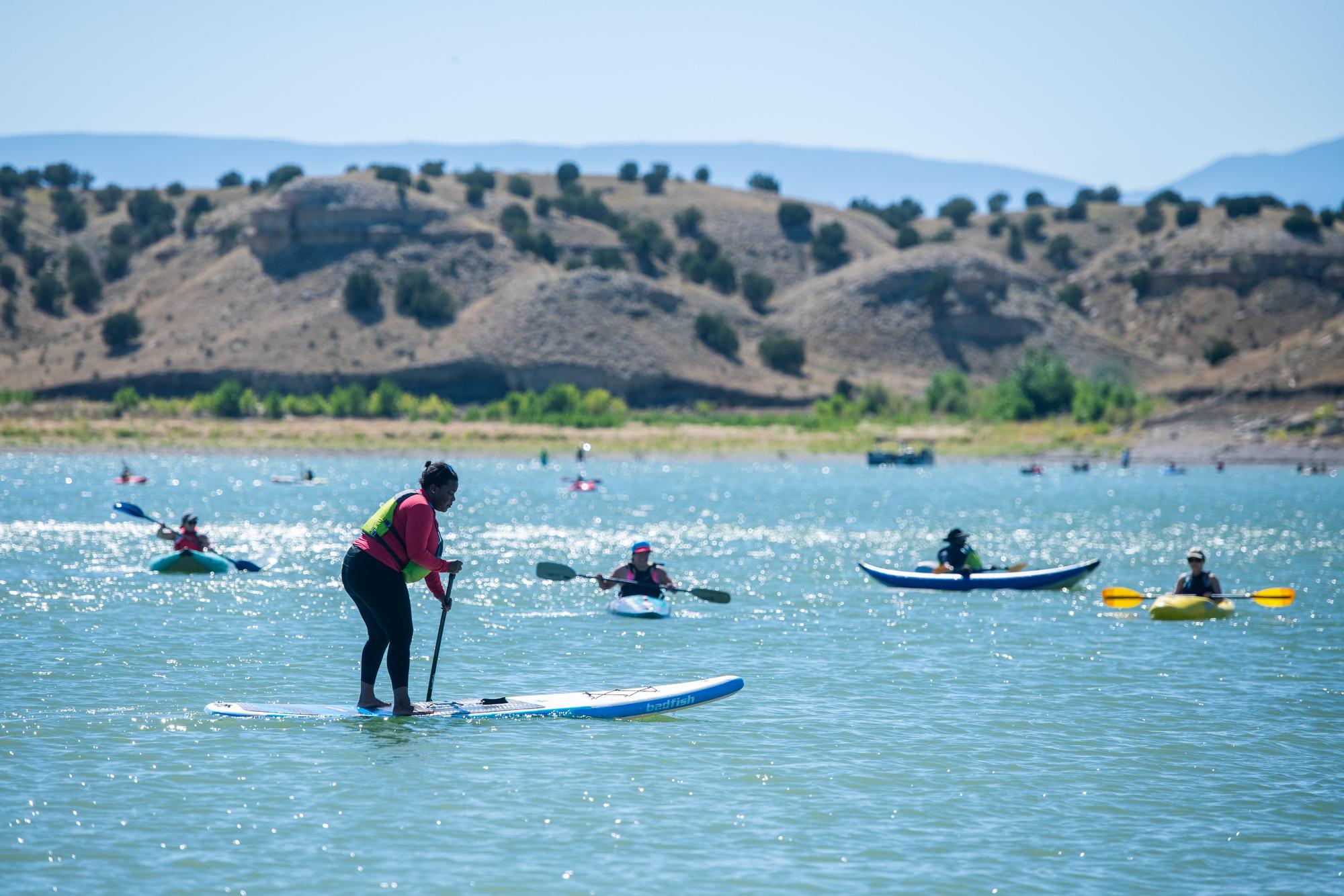
At Lake Pueblo State Park on a recent sunny Saturday afternoon, a few dozen people of color — from as near as Pueblo and as far as Cameroon — were trying paddle boards and kayaks, most for the first time.
Wearing personal flotation devices and broad smiles, they learned to handle paddles, some with different scoop shapes, depending on whether for hard or inflatable kayaks or stand-up paddle boards. A few flipped over into the chilly blue water. Others chatted over lapping waves with people they had never met before, leaning back as their kayaks bobbed under the hot sun.
Ben Talom, 23, a recent transplant from Douala, a large city in Cameroon, was relaxing on a kayak when approached by a reporter being paddled around by a volunteer in a tandem inflatable kayak. He said his sister, elsewhere on the lake, learned of the event on social media and convinced him and their cousin to try it.
“I was like, ‘Oh, awesome,’” he said, speaking with a slight accent. “I don't think she mentioned that it was the activity of people of color. But when I came here, I started seeing a lot of people of color. I was really happy. It’s always good to be surrounded by your people, people that look alike when doing outdoors activities together.”
Loveland-based Diversify Whitewater offered the free event. It is a seven-volunteer organization started by Lily Durkee, 26. An Asian woman from the DC suburbs, she studies evolutionary ecology at CSU Ft. Collins. Another volunteer head of the organization, Satya Wimbish, also a board member, was onsite to help with reporter paddling.
Durkee started the group two years ago after noticing that when she went out paddling in her spare time, she didn’t look like anyone else. So she set out to eliminate financial and social barriers to the outdoors for people of color by organizing events at no cost and finding sponsors and volunteers to help.
She got $4,000 in funding in March from Colorado’s Outdoor Equity Grant Program, a new state-run program that uses proceeds from the Colorado Lottery to fund programs that educate and get people participating in outdoor activities. They were among 43 organizations representing many types of outdoor recreation, splitting a total of $1.8 million in grants of in amounts between $4,000 and $150,000.
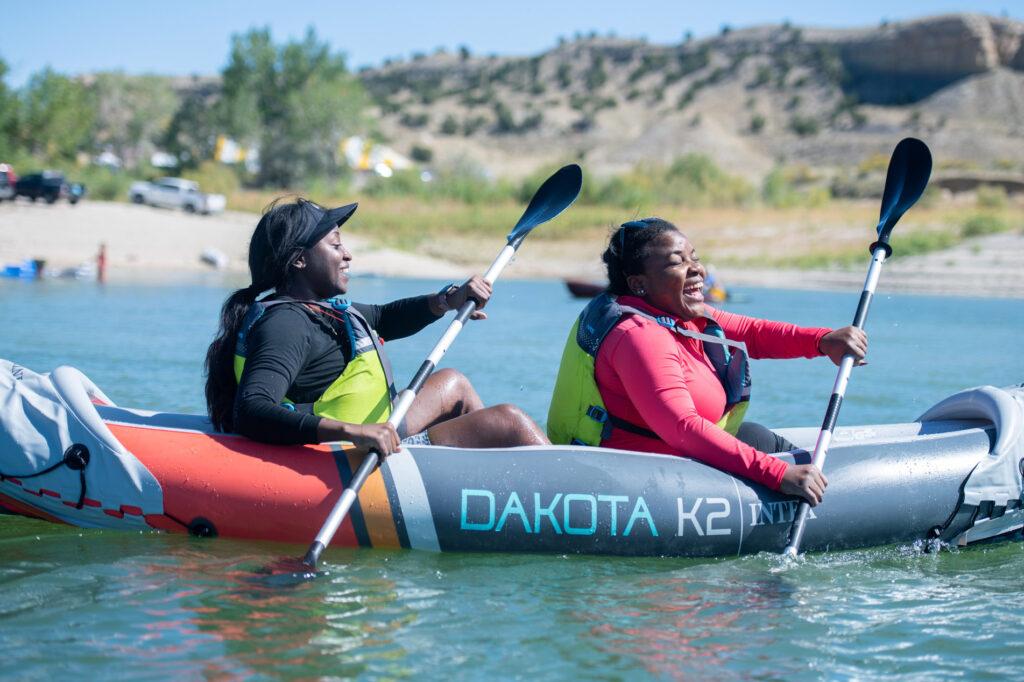
Talom provided ample testament to the power the grants have to make diverse groups feel more comfortable in Colorado’s outdoors, doing things many have never tried before.
“When you're around people that do look like you, you're a little bit more comfortable,” Talom said. "(They) help you out, guide you. They're supporting you,” and that made him comfortable to try something new.
Also on the lake that day was a Black mother whose son, on the autism spectrum, talked about catching fish in his hands. He received special attention from volunteer Mike Harvey, owner of the paddle board supply company Badfish SUP, who described paddling back mid-afternoon as “like walking on a treadmill” because of the resistant wind.
There was also a Hispanic father and his two sons from Pueblo, a Mexican couple from Northeast Park Hill, and two married white women who volunteered as allies, along with their shelter rescue dog, Miles Davis. With his own tiny blue life preserver built into his harness, the lightweight mutt calmly hopped from one paddle board to the other, and demonstrated how to fall into the deep lake with grace, shake off the water, paddle around for a moment, and then get back on the board as if nothing happened.
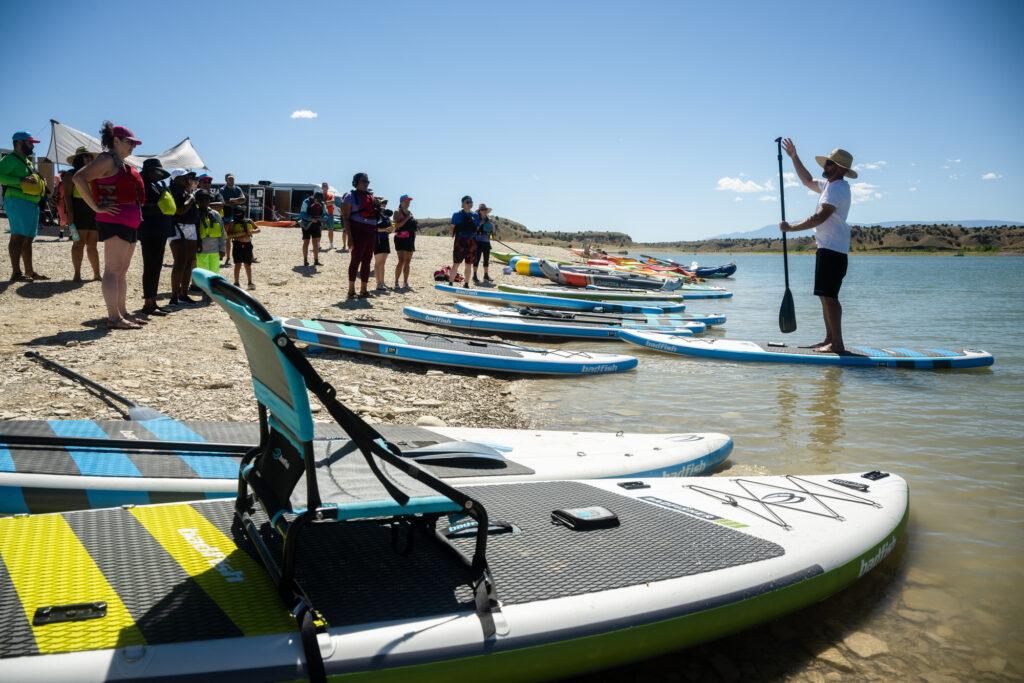
How the Colorado Outdoor Equity Grants work
The grants are authorized by a diverse 11-person board. Appointed for two or four years, members include the former president of the American Indian College Fund, the Executive Director of Great Outdoors Colorado, political and climate strategists, and students.
Outdoor Equity Grant Program Manager Andrea Kurth said the board strives to fund groups across the state, and to look to all forms of diversity including race, ethnicity, gender and sexual orientation.
“The board is balancing the size of the requests along with the geographic reach,” Kurth said. “They're also trying to balance the number of projects and investments that are being made across the whole state and then across the different populations that are named in the legislation.”
Organizations can apply until Sept. 30 for grants here.
Last year, about one in four of the 173 applications were chosen, including a Colorado Springs-based group that bought a wheelchair equipped for off-road hiking; Black Packers, an all-volunteer group that hired two staffers to promote hiking among black Coloradans, and a group in Southern Colorado that funded internships to teach people land and water ethics. A grant for $100,000 went to an organization that takes Native youth on recreational activities and pays for transportation, meals, staff salaries and equipment.
The grant funding program, similar to ones in the states of California, New Mexico and Washington, stemmed from a drive by organizations who wanted to create opportunities for youth, people of color, LGBTQIA+ people, and people who have been less likely to experience recreational activities and Colorado’s outdoor spaces, according to Kurth.
HB21-1318 was created out of this effort and was signed into law by Gov. Jared Polis in June 2021. It was sponsored by state Rep. Leslie Herod, state Rep. David Ortiz, former Senate President Leroy Garcia, and state Sen. Sonya Jaquez Lewis.
A life-changing class hike up a 14er
Around the time the bill was working its way through the legislative process, one high school teacher was exposing her students to the outdoors — and she found that the mood lift her students experienced correlates with research showing being outside makes people feel happier.
In 2020, George Washington High School Teacher Narissa Stahl Holmgren came across the 2014 book "The Adventure Gap" by Black author James Edward Mills. The book documents how minority populations see themselves belonging in nature, and tells stories of people who accomplished outdoor achievements.
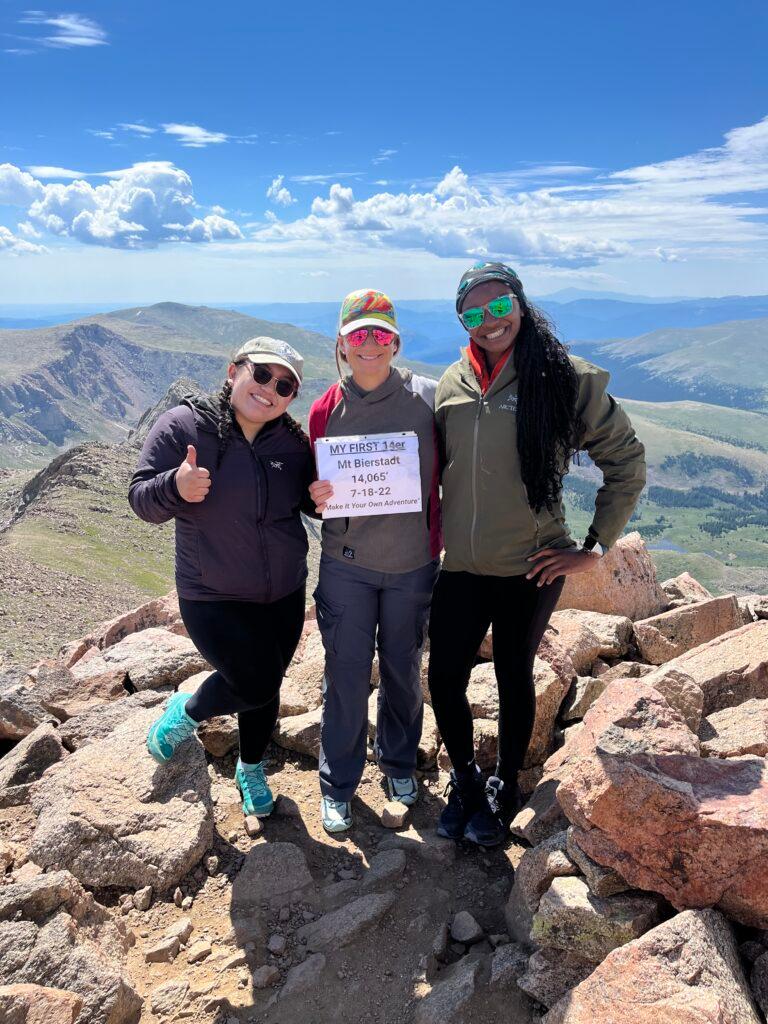
That led her to invite her students to the base of a 14er and see if she could get them to the top. They chose 14,065-foot Mount Bierstadt, meeting at the trailhead at the student-unfriendly hour of 4 a.m. this past June.
Although some struggled with altitude sickness and discovered hiking wasn’t their thing, they all bonded that day and felt a sense of celebration and unity by the time they got back to the parking lot.
“A lot of us had never got the opportunity to hike before,” said Kennedy Pinkney, who is Black. “We were just really like, nervous and kind of fearful of the idea of it,” she said.“We live in this mountain state, [yet] we’ve never been to the outdoors. Like, why not just try it?”
And she did.
“I got through that and personally I did make it to the top,” Pinkney said. “That experience for me was life-changing. Once I seen the top and seen the views, I was up there with everybody! It’s just something you never forget. I’m telling everybody, ‘Yeah, I hiked my first 14er this summer.’ They don’t even care, but I’ll tell them anyway, just ‘cause it’s something that’s really special.”
Another student who reached the summit is Brittany Saragi Sitio, who is of Indonesian descent. She stands about five feet tall. She was frustrated to see her classmates walking faster ahead of her, but that turned her shorter-strided hike into a contemplative journey.
“I knew I had to take my own time and respect my body and how I accommodated to the mountain, because I have a different journey, so doing that, it taught me a lot,” Sitio said.
When she was on the way down, the uplift she felt was so undeniable that she wanted to pass it on to others: “When we were going down, it was so easy to just communicate to others and say, ‘You’re doing amazing.’ It was so easy to share the confidence and share that joy because we were able to feel it once we summited.”
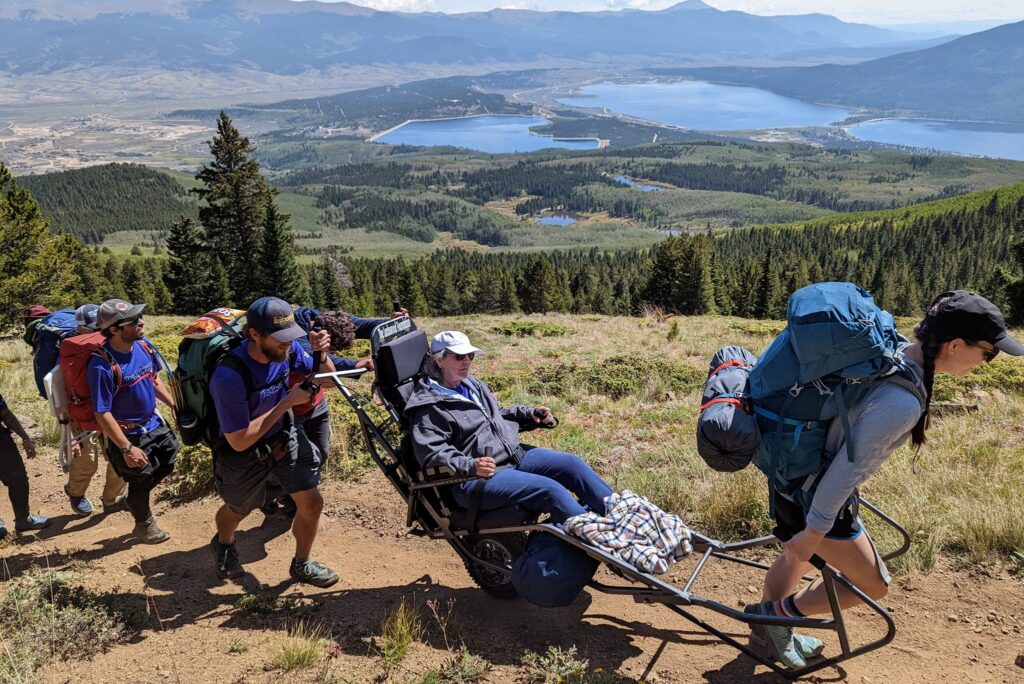
'Looking out at the view, it’s so expansive, I felt I was expansive too'
The positive feelings the teacher and students felt on that mountain are not unique. Research has emerged showing a relationship between outdoor activities and improved mental health.
In a 2019 article, “Mental Health Benefits of Nature-Based Recreation: A Systemic Review,” published in the journal Annals of Leisure Research, researchers analyzed 51 articles that talked about the relationship between outdoor activity and mental health. They found that 90 percent of the articles observed “at least one positive association between nature-based recreation and mental health, including improvements in affect, cognition, restoration and well-being,” as well as decreases in anxiety and depression.
Here in Colorado, Sarah Walker, a faculty member in the Human Dimensions of Natural Resources department at Colorado State University, and a postdoctoral researcher at CU Boulder, has been looking at this relationship as well.
“We spend time outside, we know that people's feelings of stress lower,” she said. “We know that it boosts mood, it lowers irritability, increases our ability to focus. There's even some studies that suggest that when people are outside, they have increased potential to be creative.”
That was what 67-year-old Bev Davis, a retired grandmother from Littleton who has multiple sclerosis, experienced when she found herself at the top of a different 14er.
She often uses a wheelchair, especially when going distances of greater than one city block. That makes hiking tricky. But this month she summited Mt. Elbert with the help of volunteers from the Lockwood Foundation. They guided her up the 14er in a wheelchair designed for hiking. She asked them to help her walk the last few steps by holding her arms, and when she sat down on some rocks at the very top, she burst into tears of joy.
“Looking out at the view, it’s so expansive, I felt I was expansive too,” Davis said. “I felt like something in me opened up in my heart.”
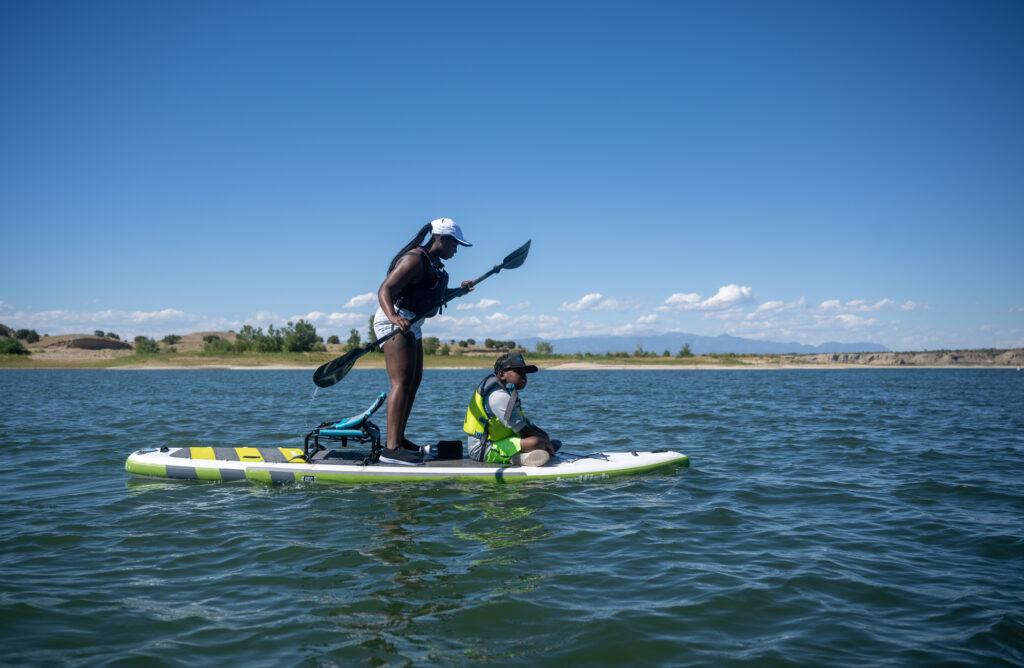
Access to the outdoors (and its benefits) is more difficult for people of color and other marginalized groups
The benefits of outdoor activities to mental health could be harder for people of color and people marginalized by disabilities or financial resources to access, as the need for the outdoor equity program stems from barriers people of color face when participating in outdoor recreation of all types.
In a recent interview, founder and president of Diversify Whitewater Lily Durkee said that people have looked at her and made her feel like they were thinking, "What are you doing here?" She said she’s also noticed that people feel safer making mistakes – falling out of a kayak or upending their SUP — when they feel surrounded by an inclusive community of people who look like them.
Income inequalities along racial lines make it more likely for white people to have a rack on the roof of their car, she said, citing less disposable income for stand-up paddleboards (costing between $400 and $1,000), life preservers, paddles, inflating pumps, water sandals, dry suits and lake entry fees as another barrier people of color face.
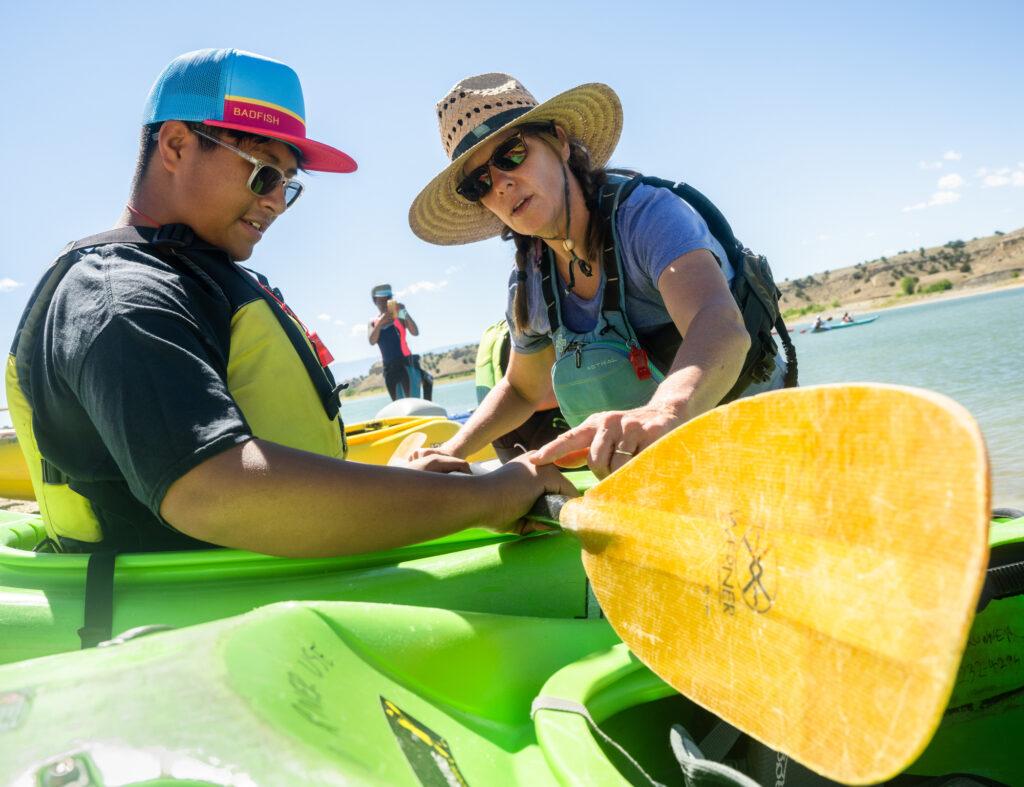
She also noticed that marketing for paddle sports has excluded people of color — a trend that may be changing. Durkee knows of one paddleboarding company that recently featured BIPOC models in product ads, a departure from their previous marketing. And the outdoor gear chain REI recently launched the “Outdoor Afro x REI Co Op” ad campaign, featuring videos and photos of Black models of varying skin tones and body sizes sporting shell jackets, trail pants and flash hiking boots.
Diversify Whitewater’s teaching event in Pueblo ended around 4 pm with the distinctive pop of inflatable rafts releasing air. Truck beds that had been emptied of boards, paddles and life jackets started to fill back up. People grabbed the last few cold pizza slices, donuts and warm sodas — all paid for with the equity grant funds — and toweled off before walking to their cars.
Jaden Hurd, a nine-year-old Hispanic Pueblo boy who’d come with his father and brother, was asked what he would give the day on a scale of one to ten. He thought for a moment, then said, “Eighteen.”
Taking off her flotation device and getting ready to wrap up in warmer clothes, Line-Audrey Nkule, 25, a graduate student studying engineering and technology management at Colorado School of Mines had come from Colorado Springs for the event with her two Cameroonian cousins, one of them Ben Talom.
“Initially I didn't believe I would make it, with the wind and the current right in the river. That was my first experience in the water,” Nkule said. “For the first two minutes, I was kneeling on the pad. But then after that, I was able to get my balance straight and then I stood. Then I was able to paddle up to halfway through, and then I turned back.”
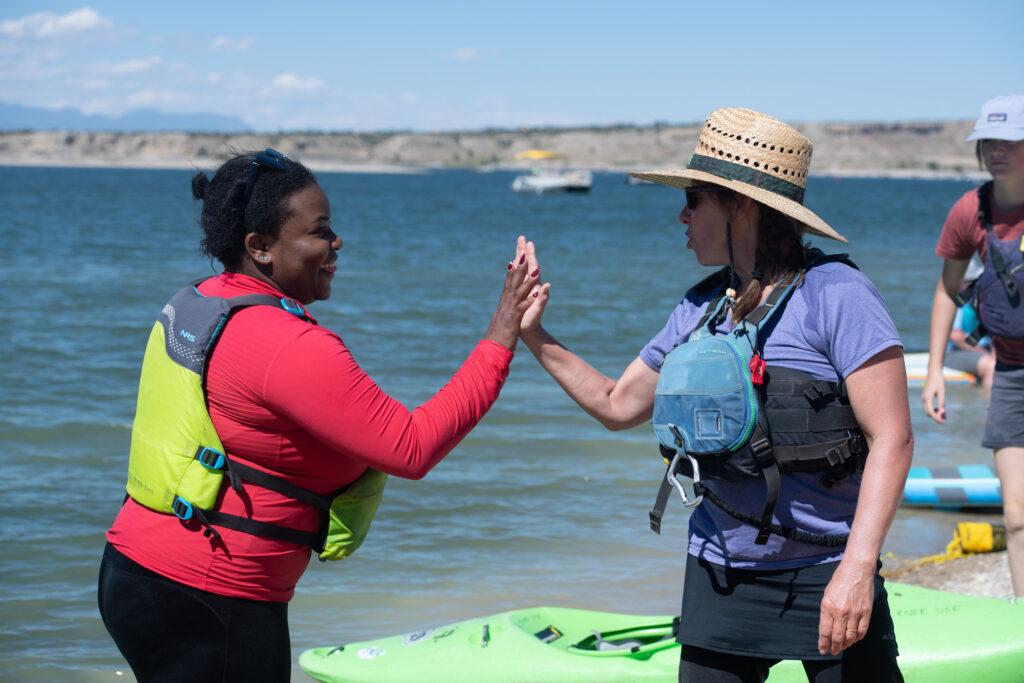
Laughing, she concluded her tale with what several people went through on the lake that day: “But then by the time I was ready to park the boat, I fell because the wind tipped me over.”
She said this event would not be her last, and she planned to dine out with her cousins right afterward.
“We're gonna sit at a nice restaurant to celebrate this … and try any other events we can find here in Colorado.”
The grant will increase its funding to as much as $3 million by 2025, depending on state lottery revenue, according to Kurth, the grant’s program manager.
There are lots of other ways people in the Denver metro area traditionally left outdoor recreation can get involved:
Denver Metro Young Life, a Denver-based organization that takes kids and teen moms to the mountains and on hiking trips.
Environmental Learning for Kids provides Denver youth 8-14 with exposure to new outdoor experiences within a framework of science & conservation to create diverse environmental stewards.
Black Girls Hike, a national organization with a chapter in Aurora, created to encourage Black women to explore the outdoors.
Black Packers, an organization started by a single woman in Colorado Springs, aims to get more black people involved in swimming, backpacking, climbing and skiing.
Adaptive Adventures, a Westminster-based organization providing outdoor adventures including kayaking for veterans, blind adults and others with challenges, customized to communities requesting their services.
Lockwood Foundation, a Pueblo-West non-profit organization that helps people with disabilities access the mountains for hiking with the help of assistive technology.









